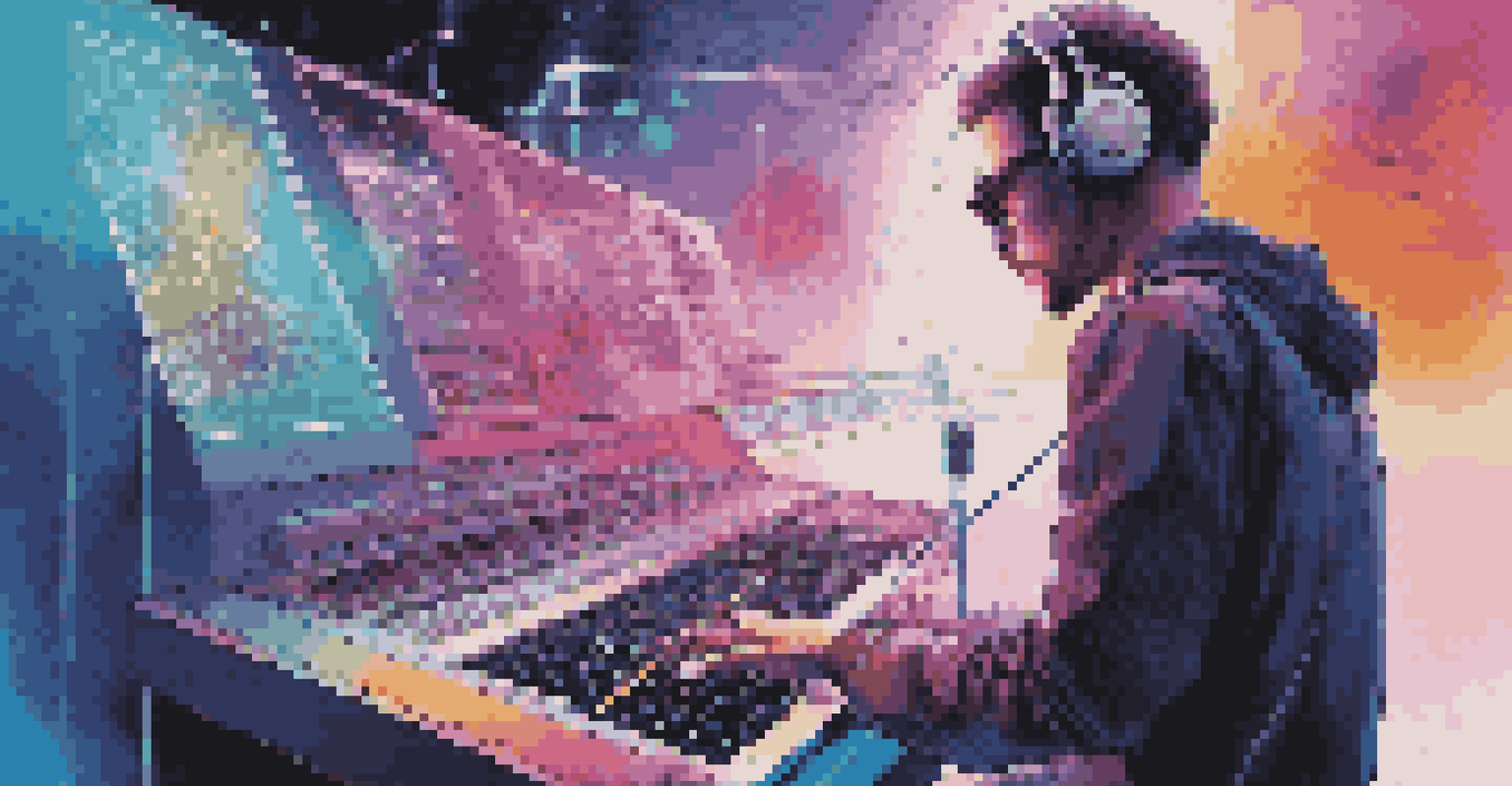The Ethics of Music Remixing in the Digital Age

Understanding Music Remixing: A Brief Overview
Music remixing involves taking existing tracks and altering them to create something new. This can include changing the tempo, adding effects, or incorporating samples from other songs. In today's digital age, remixing has become increasingly accessible, allowing more people to participate in music creation.
Remix culture is a way of seeing the past in a new light, allowing us to re-examine and reinterpret the music we love.
As technology advances, tools for remixing have evolved, making it easier for anyone with a computer to create music. Programs like Ableton Live and GarageBand open the doors for creativity, but they also raise questions about originality and ownership. The line between homage and theft can sometimes be blurry.
Remixing can be a valuable form of artistic expression, offering a fresh perspective on familiar songs. However, it also requires a careful consideration of the original artist's rights. Thus, understanding the nuances of remixing is vital for both creators and listeners.
Copyright Laws and Their Impact on Remix Culture
Copyright laws exist to protect the rights of original creators, but they can complicate remix culture. When a remix is made, it often involves using copyrighted material, which can lead to legal issues if proper permissions are not obtained. This creates a challenging landscape for aspiring remix artists who want to honor the original work while adding their own twist.

In many countries, copyright laws dictate that the original artist must approve any use of their music for remixes. This can lead to difficulties in obtaining licenses, particularly for independent creators who may lack the resources to navigate legal processes. It's a balancing act between artistic freedom and respecting the rights of the original creators.
Remixing Requires Legal Awareness
Understanding copyright laws and fair use is essential for remix artists to navigate the complexities of music creation without infringing on original works.
However, some artists choose to embrace remix culture, welcoming new interpretations of their work. This openness can foster collaboration and innovation within the music community. Understanding these dynamics is key to navigating the complex world of music remixing.
The Role of Fair Use in Remixing
Fair use is a legal doctrine that allows for limited use of copyrighted material without permission. It serves as a safety net for remix artists, enabling them to build upon existing work under certain conditions. However, understanding what constitutes fair use can be tricky and often requires a case-by-case analysis.
Creativity is allowing yourself to make mistakes. Art is knowing which ones to keep.
For example, a remix that transforms the original work significantly may qualify as fair use, while a mere duplication might not. Factors such as purpose, amount used, and market impact all play a role in determining fair use. This can lead to uncertainty for remix artists trying to stay within legal boundaries.
Ultimately, fair use can empower creativity in the remix culture, but it also demands a responsibility to respect the original artists. Being informed about fair use can help remixers navigate potential legal pitfalls while still expressing their creativity.
Ethical Considerations in Music Remixing
Beyond legal aspects, there are ethical considerations to take into account when remixing music. Respecting the original artist's vision and intent is crucial. It's essential for remixers to recognize that the original work carries meaning and significance, which should not be diluted or misrepresented.
Additionally, remix artists should consider the impact of their work on the original artist's reputation and financial viability. A poorly received remix could potentially harm the original artist's brand, especially if it doesn't align with their artistic identity. This raises the question: how do we honor creativity without compromising the integrity of the original?
Ethics Shape Remix Culture
Respecting the original artist's vision and intent is crucial for remixers to maintain the integrity and value of the original music.
Moreover, the remixing process should promote a spirit of collaboration rather than competition. By fostering a community that values and respects original creators, we can create a more sustainable and ethical approach to music remixing.
The Impact of Digital Platforms on Remixing
Digital platforms like SoundCloud, YouTube, and TikTok have revolutionized how music is shared and consumed, especially for remix culture. These platforms provide an avenue for remixers to showcase their work, reach a global audience, and connect with fellow creators. However, they also come with challenges, particularly regarding copyright enforcement.
As these platforms grow, they often implement strict copyright policies to protect original artists, which can inadvertently stifle creativity. Many remixers find their work taken down or monetized without their consent. This raises concerns about the balance between protecting artists and allowing for creative expression in the digital space.
Ultimately, while digital platforms offer unprecedented opportunities for exposure, they also necessitate a thoughtful approach to how remixers engage with copyright laws and ethical standards. Navigating this landscape requires both awareness and adaptability.
The Future of Music Remixing Ethics
As technology continues to evolve, the landscape of music remixing will likely undergo significant changes. Innovations in artificial intelligence and machine learning are already beginning to influence how music is created and remixed. This raises important questions about authorship and ownership in a world where machines can generate music.
Future discussions around the ethics of remixing will also need to address the growing influence of blockchain technology. Artists are exploring ways to use blockchain for copyright protection and royalty distribution, which could reshape the entire music industry. This shift could provide remixers with clearer guidelines and support for their creative endeavors.
Digital Platforms Offer Opportunities
While platforms like SoundCloud and YouTube provide exposure for remixers, they also present challenges related to copyright enforcement and creative freedom.
As we look ahead, it’s crucial for both artists and remixers to engage in ongoing dialogue about ethics in music. By collaborating and sharing insights, we can cultivate a future where creativity thrives while respecting the rights and contributions of all artists involved.
Conclusion: Navigating the Ethics of Remixing
In conclusion, the ethics of music remixing in the digital age requires a thoughtful approach that balances creativity with respect for original works. As remixing continues to grow in popularity, understanding the legal and ethical implications becomes increasingly important for both creators and consumers. Navigating these waters can be challenging but also rewarding.
Artists and remixers alike should strive to foster a culture of respect and collaboration. By championing originality and supporting one another, we can create a vibrant music community that embraces innovation while honoring the contributions of all artists involved. This can lead to a richer, more diverse musical landscape.

Ultimately, as we remix and reinterpret the sounds we love, let’s do so with care and consideration. By doing so, we can ensure that music remains a powerful medium for expression and connection, enriching our lives and the lives of others.